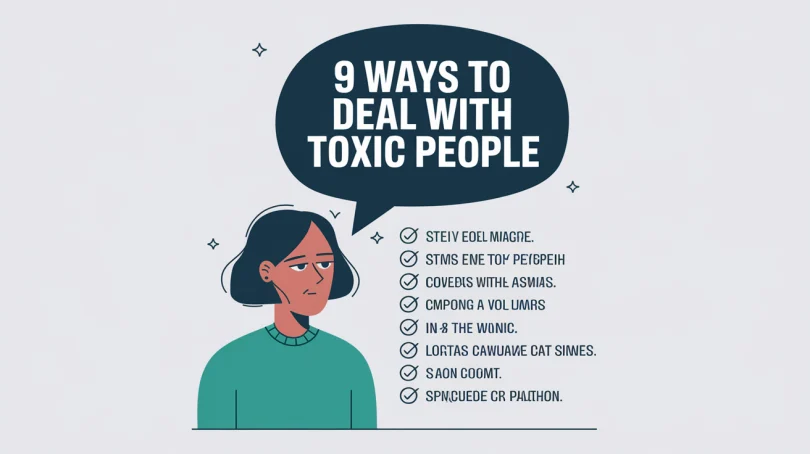Today, we’re diving into a topic that I know many of you have been asking about: how do we deal with toxic people? Whether it’s that friend who constantly drains your energy, that family member who always criticizes you, or even that colleague who just brings negativity into every room, dealing with these relationships can feel overwhelming and exhausting. But here’s the thing: know that you deserve to protect your peace and your mental health. And while we can’t always avoid these people entirely, we can learn how to manage our interactions with them in a way that doesn’t leave us feeling drained or defeated. So, let’s talk about practical steps that you can take to reclaim your energy and set boundaries that stick because remember, you’re worth it.
Setting Healthy Boundaries
Here are nine ways to better deal with toxic people, starting with number nine, which is setting healthy boundaries. Now, I talk a lot about boundaries in all sorts of different topics, but the thing to remember the most is that boundaries are not requests. Unfortunately, online, we’ll hear a lot of people saying that a boundary is like me telling you, “Stop talking to me that way.”
Now, we can do that that’s a request. I can ask you to do something, but you don’t have to listen, and I can’t make you do it, right? If any of you have ever tried to change someone else’s behavior, you quickly learn that you can’t. And so, remember: boundaries are not requests. They are what we are going to do if a certain behavior or way of talking to us continues.
Meaning, a boundary is me potentially saying, “Can you stop talking to me like that?” And if you will not stop speaking to me in that tone, I’m going to have to walk away, or I’m not going to come over here anymore, or I’m not going to spend that much time whatever the boundary is, that’s what I’m going to do because I only have control over myself and what I do.
When setting boundaries, it’s also really important to be very clear. People can’t read our minds, and us being passive-aggressive or kind of acting in a certain way, hoping that they pick up on it, isn’t going to be effective especially if we’re dealing with someone toxic. Whether it’s just the way that we interact with each other that’s toxic, or maybe they have narcissistic tendencies, whatever the case, we need to be clear and let them know what we don’t like. What behavior are they doing that we feel is unacceptable or hurtful? Let’s be clear about that. And then, what are we going to do? Make sure to spend time describing this so that we are sure that they know what our boundary is.
Related Topics:
Top 5 Overlooked Dating Red Flags
4 Ways to Torture The Narcissist
Do This to Psychologically Make Someone Like You
Forgiveness won’t save a Relationship
10 HARSH Truths About Healing From a Toxic Relationship
And once we’ve described it and been very clear, the next piece and the final piece of boundary setting is consistency. Now, nobody’s perfect. I, you guys know, am a recovering people-pleaser, and setting boundaries is not my strong suit. However, if I’ve gotten my “G” up to do it you know how you have to build yourself up to set a boundary that’s the hard part for me. But then, the important part is just being consistent about it. So, every time they say something that we’ve told them is not acceptable, we call it out, and we do the thing we said we’d do.
Like, let’s say this is through text message and not in person. Let’s say someone sends us a kind of triggering, manipulative type of text, and we’ve already told them, “Hey, can you stop sending these to me? I’m not going to reply.” Then, the consistency is that they can send us those types of texts, and we won’t reply. And then, when they send us a text that’s not that way that’s like, “Hey, I was going to go to the beach. Do you want to go?” then we reply to that and we ignore the other. That’s us upholding that boundary and being consistent.
If we give in and don’t uphold it, it can get kind of murky and confusing, and then that person can think either A) they can take advantage of us and the boundaries don’t mean anything, or B) they forget the boundaries existed in the first place. Just for recapping: it’s not a request; it’s what we’re going to do because we have control over ourselves only. We’re very clear about what the boundary is, and we stay consistent.
Number Eight: Limit Your Interaction
Oftentimes, people who are toxic, manipulative, or maybe even narcissistic either aren’t aware or are going to continue the behavior regardless. And so, sometimes, it’s best for us to just not see them as often, or not call them as often, or not interact with them at work if we don’t have to unless we’re paired together, right? And so, as much as we can, if we have a person in our life who we feel drained by, or we feel is always criticizing us, it’s okay to try to avoid them where possible.
And if there is a conversation that has to be had, let’s stick to the facts, and keep it very short and simple like, get in and get out because the less we’re triggered, the less we have to interact with someone, sometimes the better.
Number Seven: Emotional Detachment
I know, coming from a therapist, that can sound kind of weird like, “Katie, you tell us to get in touch with our emotions and to feel them.” Yes, I do. However, what emotional detachment means is that when it comes to a person in our life who is harmful, toxic, or maybe even abusive, we don’t have to emotionally connect with them.
So, this detachment has to do with our relationship with this person, meaning that we don’t share with them how we’re doing or how we’re feeling. We don’t allow them to maybe hurt us again. We also recognize their limitations and maybe the ways that they can’t support us in the way that we need. And so, we do our best to not take what they say personally kind of like knowing the origin, right? Like, if we understand where it comes from, maybe we don’t take it as personally.
And having that detachment, having that space if we haven’t shared a ton about ourselves with them if we haven’t let them in on maybe something that we’re going through and struggling with then they can’t hurt us with it, right? And so, having this space can allow us to protect ourselves a little bit better. And one easy trick to do this is just to keep conversations surface level.
You know, if we are limiting our interactions or let’s say this person’s a member of our family that means that when we do have to interact, we’re kind and cordial, but it’s more like, “Oh yeah, nice day outside, huh? Yeah, we went out for the weekend to the lake. It was nice.” We just keep it kind of basic.
We don’t say, “Yeah, work has been stressful, and I got into an argument, unfortunately, with one of my good friends,” or, “You know, I’ve just been feeling kind of depressed.” We say those things for the relationships that feel safe, that feel secure, that we feel supported. This relationship with this toxic person is just not that. And keeping that space, keeping that emotional distance, really allows us to protect ourselves so that we can continue doing what we want to do.
Number Six: Assertive Communication
I have some notes on this one this one’s important. The key piece of this is that we have to express our needs and limits clearly and confidently even if we don’t feel it, fake it till we make it in this case. Kind of going back to setting boundaries, right? We have to be clear about what we’re asking from them and what we need them to do or not do. And we’re going to have to be assertive.
And remember, assertiveness is not aggressive. I’m going to say that again: assertive is not aggressive. As a recovering people-pleaser, I will acknowledge that being assertive does feel a little rough for me, but I also know that people can handle it when people talk like that all the time. It’s just a little uncomfortable for me because I’m changing my behavior. Remember, any change is going to be uncomfortable. Anytime I try to alter the way I interact with people, it’s going to feel a little weird at first, right? Because it’s new; it’s like foreign. It can feel like that voice isn’t my own. But stick with it. It’s okay to be assertive.
Assertive means that I’m standing up for myself. I’m being direct, and I’m being clear. And that’s important when we’re dealing with people who overstep boundaries, maybe manipulate, or try to hurt us. Also, know that assertiveness isn’t like finger-pointing. We’re not blaming. Assertive sticks to the facts. It’s clear and direct. We’re not being aggressive; we’re not trying to say who’s wrong and who’s right.
And my last little note that I think is important is that as much as we can, let’s avoid getting into arguments with toxic people or trying to change their behavior because we can’t change how other people interact with us or what they do. They have full agency, right? They get to decide. But if we can do our best to mitigate like, let’s say we think they’re going to start a fight, we can feel it we can remove ourselves from the situation. We can say, “You know what? Sounds like we’re both a little heated. Let’s pick this up tomorrow.”
They might try to fight, but we can still leave again, the boundary, right? “I’m going to leave.” We don’t have to engage because if someone is draining, abusive, or manipulative, arguments are going to be something that they might enjoy being a part of, whereas we don’t know how to manage. We can find ourselves falling into those old behaviors, right? We can maybe let them overstep boundaries, we can apologize when we didn’t do anything wrong, we can start to feel worse about ourselves, or we can fall into those old patterns that we’re trying to break. And so, as much as possible, avoid arguments with these people.
Number Five: Seek Support from Others
If we’re forced to whether it’s family or work to engage with someone harmful to us, who feels very toxic, then we’re going to want to spend our other time with loving people, supportive, who make us feel fulfilled, heard, and understood and all those important pieces. So, make sure that you’re making time for that.
Maybe work’s been stressful, and it’s your boss who’s the person who acts in toxic ways. Even if we’re busy, let’s make sure that we call our friends and see them after work or on the weekend so that we are reminded that good people are out there and that all of our interactions don’t have to be so uncomfortable or so on edge. We don’t have to feel like we’re walking on eggshells all the time, right? We need to make time in our lives for those loving and supportive people.
Also, if we find ourselves struggling with our mental health because of this let’s say this abusive relationship’s been going on for years it’s going to be helpful for us to see a therapist. They can help us better understand how we’re interacting with this person, what ways we’ve been traumatized or abused, how to heal from that, and how to maybe get ourselves out of that relationship if that’s the next necessary step. Having a mental health professional on our side can help us see things more clearly.
I always feel like my friends will always have my back, even if I’m part of the dysfunction, right? Because they love me, and that’s why I love them. But they might say, “Yeah, that’s terrible. I can’t believe they talk to you that way.” But they don’t ask me how I’m interacting and if I’m maybe making it worse or feeding into it in some way. My therapist does that, though. She’ll call me out like, “Hey, did you what did you say that suddenly made this conversation jump from normal to an argument? Was there any role that you played in that?” Right?
We’re going to sometimes need this outside perspective to ask questions, to help us see where we are maybe igniting things or exacerbating something that’s already happening. And so, therapy can be great not only for the support in the healing but also for us to see our role in some of these dynamics.
Healing Workshop
Are you struggling with feelings of emptiness or disconnection? Ever felt invisible or unworthy? These could be signs of childhood emotional neglect, and now is the time to heal from them. Join my workshop, “Healing from Childhood Emotional Neglect,” on October 19th at noon Eastern Standard Time. I’ll teach you the tools and insights needed to understand your past and reclaim your future. Don’t let your childhood continue to define your adulthood. Register now and take the first step towards healing. Visit katm.com to secure your spot today. And don’t worry if you can’t join us live it’ll be recorded and available at any time.
Number Four: Build Up Your Resilience
Number four is to build up your resilience. I talk about this a lot, but it is important in all aspects of our life. Resilience is our ability to weather life’s storms. So, if someone comes into my life and is super aggressive, maybe abusive, manipulative if I don’t have any resilience, I don’t have the bandwidth to acknowledge what’s happening, even figure out that what’s happening isn’t right, and choose to act differently. That takes a lot of emotional strength, right? And emotional intelligence. There’s a lot of processing going on.
If my resilience is nothing, then I’m just going to be reactive, right? There’s no space in between maybe thought and action. Therefore, to engage more healthfully with others around us, we’re going to have to build up that resilience. I’m doing this because people call it the “window of tolerance,” and that window of tolerance is our resilience, right? It means how much can we tolerate before we dissociate or maybe fly off the handle.
And ways to build that up are pretty simple I didn’t say easy, I said simple. These are things like the acronym HALT: Are we hungry? Right? Have we eaten regularly in the last three to four hours? Is it balanced meals, or is it just food that we got at the stop-and-go? Right? We need balanced meals. Are we angry? Do we need to maybe take a break, take a breather? Are we feeling just agitated, maybe super irritated? Check in on that.
Lonely like, how long has it been since we’ve been around someone who helped us feel seen, heard, and understood? And then the T: tired. Are you sleeping well? Maybe not things might be stressful. Are we getting at least seven and a half hours of sleep a night? They say women need more than that, by the way. Research back in the day was only done on men’s surprise, surprise. So, make sure we’re getting those things taken care of.
I’d also throw in taking care of any medical conditions that we have, taking our medication as prescribed, and taking a shower sometimes, I swear, a shower can change your life. So, those are just some of the basic ways remember, simple, not always easy that we can build up that resilience. And there are more levels to this. Like, if you’re like, “Katie, I’ve got that all down pat,” then there are other things we can do to kind of build up the resilience even further.
This could be like going to therapy, journaling, making time for connections with new people, or expanding our support circle those are all other ways. But it always tracks back to kind of those basic things, those basic needs that we all have, so that our window of tolerance is very large. And then, if something distressing or upsetting happens, we have the bandwidth to manage, assess, and then decide how we want to respond not feeling reactive, almost like our emotions are at the wheel driving our car right straight into a tree, usually. So, we want to build that up so we feel like we at least have a little bit more agency over our actions.
Number Three: Avoid Being Reactive
This nicely connects to number four, the building up our resilience, right? Because if we have a higher level of resilience, then it’s less likely that we’re going to be reactive because, again, we cannot control other people. I feel like I just need to keep repeating that because I even fall into the trap where I think, “Well, if I act in a certain way, maybe they’ll be nicer. Maybe this relationship can change, and they’ll finally be the person that I want them to be the boss that I always dreamed of, or the mother, or the sister.” Right?
We can hope that we have that much control, but we don’t. And so, all we can control is ourselves and not being as reactive to maybe the way they try to kind of point the finger at us or poke at something about us. That can prevent a fight from happening; that can prevent any kind of escalation. And so, as much as we can, resist the urge to be reactive. If we can stay I’m just reading my notes here if we can stay calm and composed with them, then we’ll be better able to engage and not feel more harmed.
And if you can’t if you feel like, “I’m already like resilience is gone; I can’t take it anymore” then it’s okay to disengage. Going back to one of the other tips I offered about limiting our interaction, if we’re having a tough time let’s say we’ve had the longest day at work or school, we’re run down, maybe our kids are asking things of us, or our partner, or our friend we just feel very overwhelmed. Then, that day, or maybe even that week, might not be the time to see them because we’re not going to have that ability to not be reactive, right?
And so, it’s okay to not engage or to reschedule if we aren’t feeling our best. Also, the last little tip on this is if we are amid an engagement with them right, let’s say it’s through text, or it’s in person it’s okay if someone asks something of you or says something that sounds a little like they’re trying to attack, be aggressive, or like point the finger at you and try to blame you. It’s okay to pause and take your time before you respond. They can be like, “How come you’re not saying anything?” Like, they can try to speed it up, but we don’t have to. We don’t have to engage at that speed.
It’s okay to take a minute and think, “This is uncomfortable. I don’t know what to say to diffuse this. Maybe I should walk away.” Right? We should have that time to decide, “Maybe I don’t want to engage in this,” or, “Maybe instead, I’ll say, ‘You know what? Seems like we’re heated. I’m gonna go home.'” Right? Allow yourself to respond, not react. And taking that beat even if you just think for a second, like, “Can I breathe twice? Breathe in and out, and do it again before I respond?” will give me the time needed to maybe make a better decision.
Number Two: Their Behavior Isn’t About You
I know this is hard for us to accept or even agree upon 100% of the time, but when someone has a pattern of behavior right, if we know this person has had similar disagreements or arguments or has broken friendships maybe you’re part of like a friend group, and this person is only friends with you, and everybody else has been like, “I can’t handle them” we have to recognize that it’s not just us.
Sure, it is healthy for us to acknowledge our role in the relationship specifically, but beyond that, we have to understand that there’s something bigger going on, right? Maybe they’re having their own tough time at home that they’re not sharing with anybody. Maybe they do have narcissistic tendencies or struggle with emotion regulation, right? That has more to do with them. And their reactivity towards you isn’t about you. If you weren’t in the picture, it’d be somebody else.
And sometimes, we need that reminder to be like, “Hey, I can clean my side of the road in this relationship, but I’m not responsible for theirs.” And whatever else is going on, I can’t control them, right? I can’t make them get help or change. And so, a lot of what they’re doing has nothing to do with me. Taking that into consideration—that there are probably a lot of other things going on with them that have nothing to do with you can hopefully allow you to not internalize their negativity, right?
If they want to say certain things about you, we have to consider the source, right? One of my favorite quotes ever is that I’m not going to take criticism from someone that I wouldn’t go to for advice. I’m going to say that again because this helps me in a lot of situations in my life: “I’m not going to take criticism from someone that I don’t go to for advice.” Trust me, I’m on the internet; I get a lot of criticism. I get a lot of unsolicited advice from people out there. But if I don’t know them, and they don’t know me, and I’m not going to go to them and ask them for their thoughts on something, then why am I taking their criticism?
So, just remind yourself of that because, to me, that’s been such a powerful shift to just consider it. It doesn’t mean that words won’t hurt us and that we won’t be affected by what someone says, but it also shows us where we need to limit interaction, take a break from social media, maybe not text back, or block someone. But if we wouldn’t turn to them for advice, we shouldn’t take their criticisms either.
Number One: Know When to Walk Away
Sometimes, we have to recognize when the relationship is just too harmful or abusive for us to continue, right? Sometimes, we have to cut our losses and walk away completely. It doesn’t mean it’s going to be easy. I know from hearing from a lot of people in our community and even friends of mine that we’ve had to cut ties with either a very close friend or maybe a family member. And that decision should not be made lightly. It shouldn’t be something we quickly decide to do.
But we also need to recognize when staying in a relationship is doing more harm than good and when maybe it’s better for both of us to not be together anymore to not engage anymore. Too often, we stay in relationships for a long period, worrying so much about how our leaving or our interactions are going to potentially hurt them. “How are they going to feel?” And we never consider that, “Hey, in all these years that I’ve been in a relationship with this person, they’ve never been concerned about how their actions affect me,” right?
I’ve never heard them say something about, “Oh, I’m so sorry,” right? If someone is truly toxic in our life, chances are they aren’t great at apologizing. And so, why should we stay in a relationship over the concern or potential guilt about how it’s going to make them feel when they don’t do the same for us? They’re not worried about how their actions affect us.
It’s almost like my favorite quote ever and I don’t even know who said it; I wish I knew who coined this phrase but, “Don’t light yourself on fire to keep someone else warm.” And in toxic relationships, we can find ourselves doing that, right? “I’m so worried I might hurt their feelings,” meanwhile, they’re being super abusive and manipulative, and they’re not concerned. And so, know when you should cut ties. I know it’s not an easy thing to do, but sometimes, it’s self-preservation.






